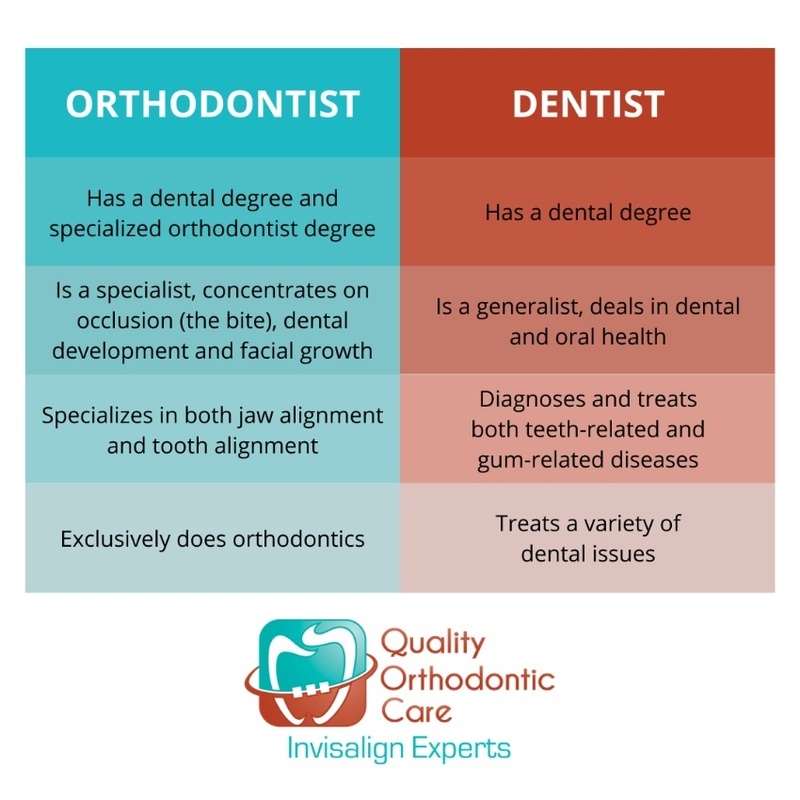How Causey Orthodontics can Save You Time, Stress, and Money.
How Causey Orthodontics can Save You Time, Stress, and Money.
Blog Article
How Causey Orthodontics can Save You Time, Stress, and Money.
Table of ContentsNot known Facts About Causey OrthodonticsCausey Orthodontics Things To Know Before You BuySome Known Details About Causey Orthodontics The Of Causey OrthodonticsNot known Details About Causey Orthodontics How Causey Orthodontics can Save You Time, Stress, and Money.The smart Trick of Causey Orthodontics That Nobody is Talking About
What is the distinction between a dental practitioner and an orthodontist? All dental practitioners, including orthodontists, treat the teeth, periodontals, jaw and nerves.
Orthodontists and dental practitioners both provide dental look after individuals. Orthodontists can operate in an oral workplace and supply the very same therapies as various other dentists. So you can think of both medical professionals that treat gum and teeth problems. The major distinction is that becoming an orthodontist requires a particular specialty in treating the misalignment of the teeth and jaw.
Not known Factual Statements About Causey Orthodontics
An orthodontist is a dental professional that has actually gone through training to specialize in the diagnosis, avoidance and treatment of abnormalities in the jaw and teeth. Their training includes remedying these existing conditions. They can also determine possible problems in teeth positioning that may create when problems are left untreated. Orthodontists can assist individuals of any ages.
This consists of all the required education and learning to become a general dentist. According to the American Student Dental Organization (ASDA), it suggests you will need to have either a Physician of Medication in Dentistry (DMD) or a Physician of Oral Surgery (DDS). In other words, orthodontists require to finish dental institution and after that get an orthodontics specialized education.
Some orthodontists also get their masters in craniofacial biology. These programs concentrate on two particular areas or disciplines: Dentofacial Orthopedics: This research study focuses on guiding teeth and jaw development.
9 Easy Facts About Causey Orthodontics Described

 The total objective of an orthodontist is to improve a client's bite. Not everyone is birthed with straight teeth, and an orthodontist will certainly make sure that people get evenly spaced straight teeth.
The total objective of an orthodontist is to improve a client's bite. Not everyone is birthed with straight teeth, and an orthodontist will certainly make sure that people get evenly spaced straight teeth.
The 7-Minute Rule for Causey Orthodontics
The American Association of Orthodontists suggests your very first check up by age 7. You'll require to see your orthodontist if you have a misalignment in your teeth, also referred to as malocclusion. If you observe uneven bite patterns, a slightly misshapen jaw, or when your teeth are chock-full, you will likely need orthodontic therapy.
In addition, we offer adjustable therapy schedules, flexible repayment choices and a fun, enjoyable experience.
An orthodontist is a dentist educated to detect, stop, and treat teeth and jaw abnormalities. Orthodontists work with individuals of all ages, from children to adults (https://freeimage.host/causeyortho7).
Some Of Causey Orthodontics
Malocclusion, or misaligned teeth, can cause oral problems, consisting of tooth decay, periodontal illness, and challenging or unpleasant chewing. Not every person is birthed with straight teeth. If you have a poor bite or big spaces between your teeth, you may wish to consult a dental practitioner specializing in orthodontic care.
(Photo Credit Scores: DigitalVision/Getty Images) Orthodontists utilize repaired and removable dental devices, like dental braces, retainers, and bands, to alter the position of teeth in your mouth. Orthodontic treatment is for dental abnormalities, consisting of: Misaligned teethBite issues, like an overbite or an underbiteCrowded teeth or teeth that are as well far apartJaw misalignmentThe goal of orthodontic therapy is to boost your bite.
The Main Principles Of Causey Orthodontics

All orthodontists are dentists, yet not all dental professionals are orthodontists. Orthodontic residency programs use extensive, concentrated direction for oral experts. They focus on two areas: How to correctly and safely move teeth How to correctly assist advancement in the teeth, jaw, and faceOnce an orthodontist has actually finished training, they have the alternative to end up being board accredited.
Imbalance, or malocclusion, is one of the most usual reason people see an orthodontist. It is genetic and is the outcome of size differences between the top and reduced jaw or in between the jaw and teeth. orthodontist near me. Malocclusion brings about tooth overcrowding, an askew jaw, or uneven bite patterns. Malocclusion is generally treated with: Your orthodontist affixes metal, ceramic, or plastic square bonds to your teeth.
Causey Orthodontics Can Be Fun For Anyone
If you have only minor malocclusion, you might have the ability to use clear dental braces, called aligners, instead of conventional dental braces. Some individuals require a headgear to assist relocate teeth right into line with stress from outside the mouth. After braces or aligners, you'll need to use a retainer. A retainer is a personalized device that keeps your teeth in area.
Report this page